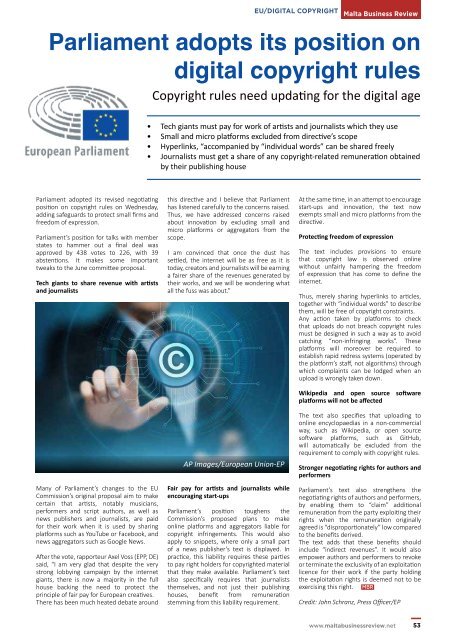MBR ISSUE 44
Create successful ePaper yourself
Turn your PDF publications into a flip-book with our unique Google optimized e-Paper software.
EU/DIGITAL COPYRIGHT<br />
Malta Business Review<br />
Parliament adopts its position on<br />
digital copyright rules<br />
Copyright rules need updating for the digital age<br />
• Tech giants must pay for work of artists and journalists which they use<br />
• Small and micro platforms excluded from directive’s scope<br />
• Hyperlinks, “accompanied by “individual words” can be shared freely<br />
• Journalists must get a share of any copyright-related remuneration obtained<br />
by their publishing house<br />
Parliament adopted its revised negotiating<br />
position on copyright rules on Wednesday,<br />
adding safeguards to protect small firms and<br />
freedom of expression.<br />
Parliament’s position for talks with member<br />
states to hammer out a final deal was<br />
approved by 438 votes to 226, with 39<br />
abstentions. It makes some important<br />
tweaks to the June committee proposal.<br />
Tech giants to share revenue with artists<br />
and journalists<br />
Many of Parliament’s changes to the EU<br />
Commission’s original proposal aim to make<br />
certain that artists, notably musicians,<br />
performers and script authors, as well as<br />
news publishers and journalists, are paid<br />
for their work when it is used by sharing<br />
platforms such as YouTube or Facebook, and<br />
news aggregators such as Google News.<br />
After the vote, rapporteur Axel Voss (EPP, DE)<br />
said, “I am very glad that despite the very<br />
strong lobbying campaign by the internet<br />
giants, there is now a majority in the full<br />
house backing the need to protect the<br />
principle of fair pay for European creatives.<br />
There has been much heated debate around<br />
this directive and I believe that Parliament<br />
has listened carefully to the concerns raised.<br />
Thus, we have addressed concerns raised<br />
about innovation by excluding small and<br />
micro platforms or aggregators from the<br />
scope.<br />
I am convinced that once the dust has<br />
settled, the internet will be as free as it is<br />
today, creators and journalists will be earning<br />
a fairer share of the revenues generated by<br />
their works, and we will be wondering what<br />
all the fuss was about.”<br />
AP Images/European Union-EP<br />
Fair pay for artists and journalists while<br />
encouraging start-ups<br />
Parliament’s position toughens the<br />
Commission’s proposed plans to make<br />
online platforms and aggregators liable for<br />
copyright infringements. This would also<br />
apply to snippets, where only a small part<br />
of a news publisher’s text is displayed. In<br />
practice, this liability requires these parties<br />
to pay right holders for copyrighted material<br />
that they make available. Parliament’s text<br />
also specifically requires that journalists<br />
themselves, and not just their publishing<br />
houses, benefit from remuneration<br />
stemming from this liability requirement.<br />
At the same time, in an attempt to encourage<br />
start-ups and innovation, the text now<br />
exempts small and micro platforms from the<br />
directive.<br />
Protecting freedom of expression<br />
The text includes provisions to ensure<br />
that copyright law is observed online<br />
without unfairly hampering the freedom<br />
of expression that has come to define the<br />
internet.<br />
Thus, merely sharing hyperlinks to articles,<br />
together with “individual words” to describe<br />
them, will be free of copyright constraints.<br />
Any action taken by platforms to check<br />
that uploads do not breach copyright rules<br />
must be designed in such a way as to avoid<br />
catching “non-infringing works”. These<br />
platforms will moreover be required to<br />
establish rapid redress systems (operated by<br />
the platform’s staff, not algorithms) through<br />
which complaints can be lodged when an<br />
upload is wrongly taken down.<br />
Wikipedia and open source software<br />
platforms will not be affected<br />
The text also specifies that uploading to<br />
online encyclopaedias in a non-commercial<br />
way, such as Wikipedia, or open source<br />
software platforms, such as GitHub,<br />
will automatically be excluded from the<br />
requirement to comply with copyright rules.<br />
Stronger negotiating rights for authors and<br />
performers<br />
Parliament’s text also strengthens the<br />
negotiating rights of authors and performers,<br />
by enabling them to “claim” additional<br />
remuneration from the party exploiting their<br />
rights when the remuneration originally<br />
agreed is “disproportionately” low compared<br />
to the benefits derived.<br />
The text adds that these benefits should<br />
include “indirect revenues”. It would also<br />
empower authors and performers to revoke<br />
or terminate the exclusivity of an exploitation<br />
licence for their work if the party holding<br />
the exploitation rights is deemed not to be<br />
exercising this right. <strong>MBR</strong><br />
Credit: John Schranz, Press Officer/EP<br />
www.maltabusinessreview.net<br />
53

















